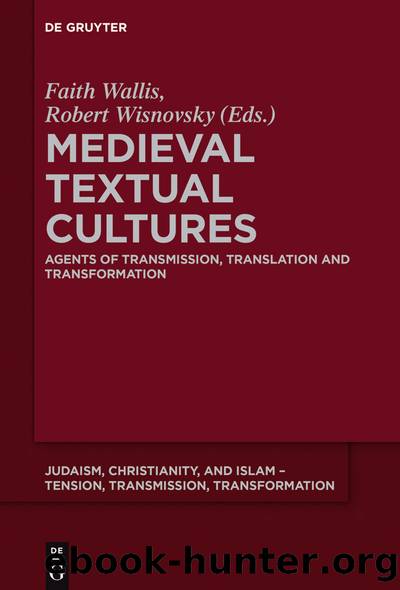Medieval Textual Cultures by Faith Wallis Robert Wisnovsky

Author:Faith Wallis, Robert Wisnovsky
Language: eng
Format: epub
Publisher: Walter de Gruyter
Published: 2016-01-15T00:00:00+00:00
Frank T. Coulson
Literary criticism in the Vulgate Commentary on Ovidâs Metamorphoses
Of the numerous Latin commentaries written on the Metamorphoses in the High Middle Ages, perhaps none was so influential as that commentary generally referred to as the âVulgate.â315 First, the circulation of the text itself was wide-ranging, both in its geographical dissemination, as well as the number of manuscript copies produced.316 Secondly, although the Vulgate Commentary was not printed, its approach to the explication of the poem has been shown to have influenced the later Renaissance commentary of Raphael Regius, who is considered to be the most important humanist commentator on the Metamorphoses.317 And thirdly, the Vulgate Commentary may be considered a seminal work in the evolution of the Latin commentary tradition on Ovid because of its highly sophisticated approach to the explication of the text. Unlike the purely allegorical tradition represented by such texts as Arnulf of Orléansâs Allegoriae318 and Pierre Bersuireâs Ovidius moralizatus,319 the Vulgate Commentary adopts a multifaceted approach, and demonstrates a highly developed interest not only in questions of grammar and syntax, but also in what may be termed âmodernâ interpretive questions, such as structure, characterization, style, and Ovidian influence on subsequent writers. In the present article, I consider a more discrete aspect of the approach of the Vulgate Commentary to the explication of Ovidâs epic, namely how our commentator references prose authors and poets nearly contemporaneous with him either to bolster an interpretation of the Ovidian passage under discussion, or to elucidate Ovidian influence on Latin writers of the Middle Ages. But before examining this specific question more closely, allow me to say a few words about the Vulgate Commentary in order to place the commentary more clearly within its cultural and intellectual milieu.
The Vulgate Commentary on the Metamorphoses was a product of the rich school tradition on classical poetry which developed in the Loire valley of France during the twelfth and thirteenth centuries, most notably at the cathedral school at Orléans.320 Internal references in the commentary itself, as well as the date of the earliest exemplars of the commentary, place the date of its composition to the mid-thirteenth century.321 The importance of the Vulgate Commentary for our understanding of the school tradition on Ovid was signalled as early as 1920 by Luigi Castiglioni.322 While Castiglioni knew of five witnesses to the text, my own research on the commentary, conducted over the last twenty years, has uncovered twenty-two extant witnesses.
One reason why the Vulgate Commentary may be considered so central to the commentary tradition on Ovid is that it synthesizes the medieval scholarship on the poet from the eleventh century down to the mid-thirteenth century. Many of its glosses and longer comments are drawn directly from earlier commentaries of German origin, now preserved in manuscripts at the Bayerische Staatsbibliothek in Munich.323 Additionally, the sources for many of the allegories are drawn from the earlier work of Arnulf, who was an influential master at Orléans in the later twelfth century. Grammatical glosses adapted directly from the
Download
This site does not store any files on its server. We only index and link to content provided by other sites. Please contact the content providers to delete copyright contents if any and email us, we'll remove relevant links or contents immediately.
| Ancient & Classical | Arthurian Romance |
| Beat Generation | Feminist |
| Gothic & Romantic | LGBT |
| Medieval | Modern |
| Modernism | Postmodernism |
| Renaissance | Shakespeare |
| Surrealism | Victorian |
4 3 2 1: A Novel by Paul Auster(12343)
The handmaid's tale by Margaret Atwood(7714)
Giovanni's Room by James Baldwin(7274)
Asking the Right Questions: A Guide to Critical Thinking by M. Neil Browne & Stuart M. Keeley(5722)
Big Magic: Creative Living Beyond Fear by Elizabeth Gilbert(5694)
Ego Is the Enemy by Ryan Holiday(5365)
The Body: A Guide for Occupants by Bill Bryson(5040)
On Writing A Memoir of the Craft by Stephen King(4896)
Ken Follett - World without end by Ken Follett(4691)
Adulting by Kelly Williams Brown(4540)
Bluets by Maggie Nelson(4522)
Eat That Frog! by Brian Tracy(4486)
Guilty Pleasures by Laurell K Hamilton(4398)
The Poetry of Pablo Neruda by Pablo Neruda(4072)
Alive: The Story of the Andes Survivors by Piers Paul Read(4003)
White Noise - A Novel by Don DeLillo(3983)
Fingerprints of the Gods by Graham Hancock(3968)
The Book of Joy by Dalai Lama(3951)
The Bookshop by Penelope Fitzgerald(3818)
